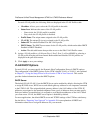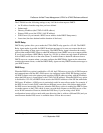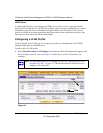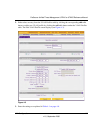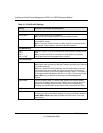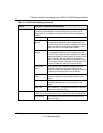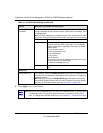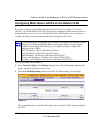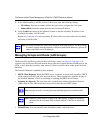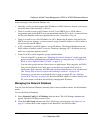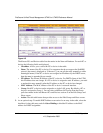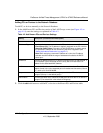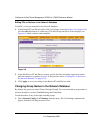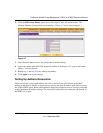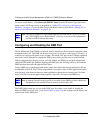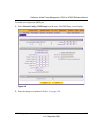
ProSecure Unified Threat Management UTM10 or UTM25 Reference Manual
4-12 LAN Configuration
v1.0, September 2009
3. In the Add Secondary LAN IPs section of the screen, enter the following settings:
• IP Address. Enter the secondary address that you want to assign to the LAN ports.
• Subnet Mask. Enter the subnet mask for the secondary IP address.
4. Click the add table button in the rightmost column to add the secondary IP address to the
Available Secondary LAN IPs table.
Repeat step 3 and step 4 for each secondary IP address that you want to add to the Available
Secondary LAN IPs table.
Managing Groups and Hosts (LAN Groups)
The Known PCs and Devices table on the LAN Groups screen (see Figure 4-5 on page 4-14)
contains a list of all known PCs and network devices that are assigned dynamic IP addresses by the
UTM, or have been discovered by other means. Collectively, these entries make up the Network
Database.
The Network Database is updated by these methods:
• DHCP Client Requests. When the DHCP server is enabled, it accepts and responds to DHCP
client requests from PCs and other network devices. These requests also generate an entry in
the Network Database. This is an advantage of enabling the DHCP Server feature.
• Scanning the Network. The local network is scanned using Address Resolution Protocol
(ARP) requests. The ARP scan detects active devices that are not DHCP clients.
• Manual Entry. You can manually enter information about a network device.
Note: Secondary IP addresses cannot be configured in the DHCP server. The hosts on the
secondary subnets must be manually configured with the IP addresses, gateway IP
address and DNS server IP addresses.
Note: In large networks, scanning the network might generate unwanted traffic.
Note: When the UTM receives a reply to an ARP request, it might not be able to
determine the device name if the software firewall of the device blocks the
name.



